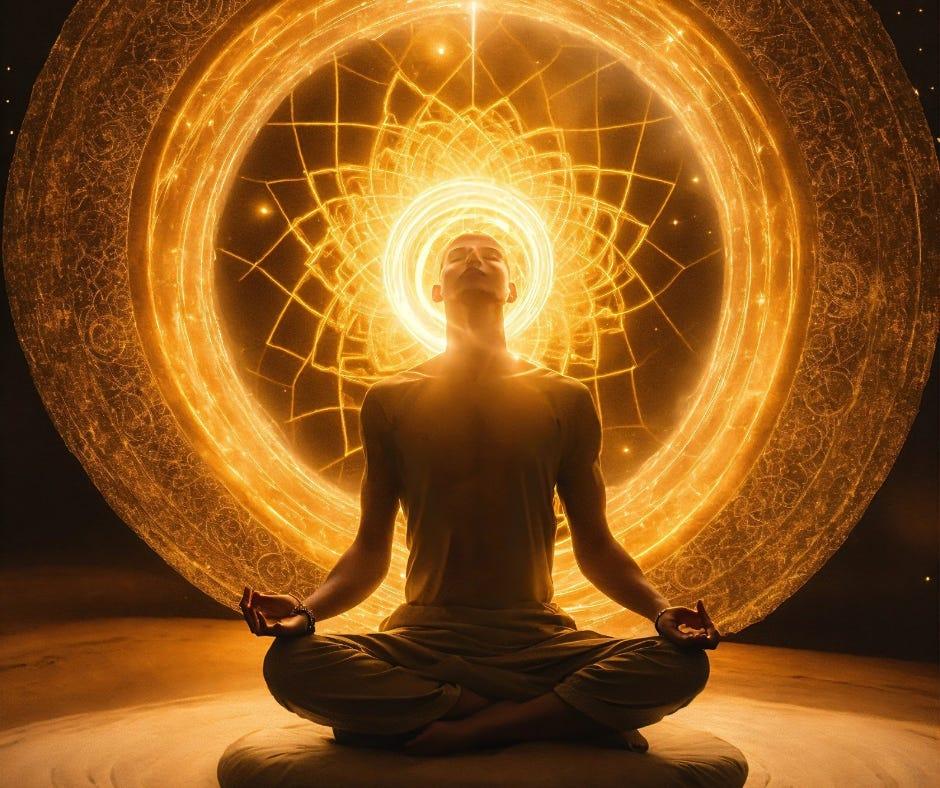5 Spiritual States of Action and Awareness You Must Understand | कर्ता, कर्म, क्रिया और चेतना
Our daily life unfolds across various layers of doing (कर्म), effort (क्रिया), intention (कर्ता), and inner Awareness ( चेतना ). But not all actions are the same, and neither is our awareness during them. Sanatana Dharma offers a deep lens into these layers through five distinct spiritual states—each revealing how conscious or unconscious we are as we live, act, and react. Some states bind us to suffering, while one rare state can liberate us entirely. In this article delight, explore 5 Spiritual States of Action and Awareness You Must Understand with examples, philosophical insights, and why understanding them is key to living with clarity, freedom, and peace.
Understanding 5 Spiritual States of Action and Awareness | कर्ता, कर्म, क्रिया और चेतना
The Sleepwalker’s State: Action Without Awareness
This is the state where the body and mind are active, actions are being performed, but there is no conscious awareness of what’s happening. It’s like walking while asleep—things are being done, but the one who does isn’t truly there. In daily life, this shows up when we perform tasks in autopilot mode, unaware of the consequences we’re creating. Karma is formed, but unconsciously—making us victims of our own doing.
Doer (Karta): Present
Karma (Action Done): Yes
Kriya (Process Happening): Yes
Awareness: Absent
Example: Sleepwalking
The Silent Void: When Nothing Happens
In this state, nothing is functioning—there is no doer, no doing, and no awareness. It is the complete absence of life, karma, and consciousness. The experiencer of life is no longer in the body. Philosophically, this reminds us that the engine of karma runs only while we are alive and aware. Once the spark of consciousness leaves the body, everything stops.
Doer (Karta): Absent
Karma: Absent
Kriya: Absent
Awareness: Absent
Example: Death
The Responsible Human: Fully Involved Yet Unquestioning
This is the common state of everyday living. People act consciously, make decisions, and accept that they are the doers. However, awareness in this state is often limited to ownership of the action rather than observation of it. Many cry over suffering later, asking “Why me?”—because even though the karma was done consciously, it was not accompanied by true reflective awareness. This state lacks detachment.
Doer (Karta): Present
Karma: Yes
Kriya: Yes
Awareness: Yes (but attached)
Example: Regular conscious action, like working or parenting
The Passive Self: Inaction Wrapped in Activity
Imagine lying on your bed, not intending to sleep, but also not intentionally thinking. Thoughts float by, your body is inactive, yet mental activity is subtly unfolding. You aren’t choosing these thoughts; they’re just arising and fading.
In this state, there is no deliberate karma being created—no intentional act with consequence—yet kriya (internal movement) is happening. The doer (ego-sense) still exists but isn’t engaged. And since there’s no awareness of what’s happening, the experiencer is lost in passivity.
This state points to how kriya can occur even when karma isn’t being created, simply because the doer isn’t consciously involved, and awareness has taken a back seat.
Doer (Karta): Present
Karma: Absent
Kriya: Yes
Awareness: Absent
Example: Daydreaming while lying down, unaware of your thoughts drifting
All five states of Karta (Doer), Karma (Action), Kriya (Process), and Awareness
| State | Doer (Karta) | Karma (Action Done) | Kriya (Process Happening) | Awareness Present? | Example | Essence |
|---|---|---|---|---|---|---|
| 1 | Yes | Yes | Yes | No | Sleepwalking | Unaware Doing – Karma created unconsciously |
| 2 | No | No | No | No | Death | Non-Being – No doing, no awareness |
| 3 | Yes | Yes | Yes | Yes | Conscious actions | Responsible Living – Aware doing |
| 4 | Yes | No | Yes | No | Sleep | Natural Inactivity – Unaware non-doing |
| 5 | Yes | Yes | Yes | Yes (Aware: “I am not the doer”) | Witnessing while eating, acting | Sakshi Bhava – Awareness without Identification |
Why This Final State Matters Most
When all seems to be falling apart—when chaos strikes, health deteriorates, or death approaches—only the one who lives in Sakshi Bhava remains free from panic. They may cry or seek help on the surface, but deep within, they rest in stillness. On the other hand, if we cling to outcomes or expect God to fix our suffering while refusing to work on our awareness, the path remains incomplete.
Final Takeaway | 5 Spiritual States of Action and Awareness You Must Understand
While most people live within the first few states, trapped in their actions and suffering without awareness, the ultimate goal is to reach that rare and transformative state of pure witnessing. Where you are present but not attached to the outcomes, where actions flow without identification. This shift is not instantaneous; it requires dedication, practice, and a commitment to deepening awareness. As you move through life, observe which state you are in at any given moment. And remember, the more aware you become, the closer you get to transcending fear and suffering. In the end, the greatest freedom comes not from changing the world around us, but from changing how we experience it. By shifting from doing to simply being !
Further insights, read The Seven Spiritual Laws of Success https://amzn.to/4jB9v5t
Read also : 7 Demons Krishna Slew—and Their Modern Forms in Us https://thebrightdelights.com/7-demons-krishna-slew-and-their-modern-forms-in-us/
